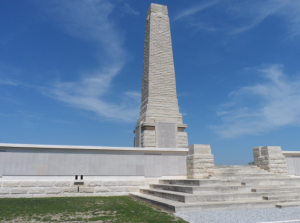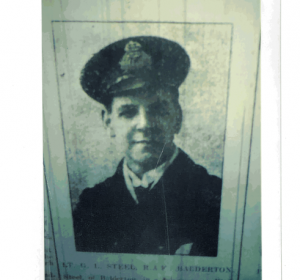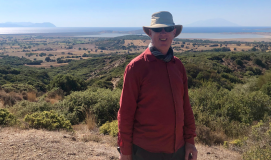Freelance battlefield guide and Newark Business Club member Dudley Giles has just returned from a 10 day visit to the Gallipoli battlefields in Turkey, where he was able to pay his respects to many of the men from the Newark and Sherwood area who lost their lives on the peninsula more than 100 years ago.
One of his first calls was to the magnificent Helles Memorial. This stands proudly at the entrance to the Dardanelles and acts as a navigation feature for passing ships.

The memorial was erected to record the names of nearly 21,000 men who died during the Gallipoli campaign but have no known graves. It remembers, amongst others, 43-year-old Quartermaster Lt Arthur Ewin, of the Sherwood Foresters, who lived in Montague House, Syerston; 21-year-old Pte Ernest Allison, of 12 Queen Street, Newark; and Royal Marine Pte Thomas Garrett, of Langar. Photographs of the latter two men can be seen in a book of remembrance currently held by the Friends of Newark Cemetery.
The Helles Memorial also carries the names of seven members of the Nottinghamshire Yeomanry (Sherwood Rangers), including its commanding officer, Lt Col Sir John Milbanke VC, and stretcher bearer, Pte ‘Bert’ Colton. Both lost their lives on 21/22 August 1915, attacking Hill 70 in Suvla Bay, during some of the bloodiest fighting of the whole Gallipoli campaign.
Bert Colton, a resident of Harcourt Street and an old boy of Magnus School, had worked for a Newark auctioneer before the war and was also a scoutmaster. He was credited with bringing in up to 34 casualties before being mortally wounded in the head by a Turkish bullet.
Dudley’s next stop was to the nearby Lancashire Landing Cemetery. This cemetery contains the grave of Balderton resident Lt Leonard Steel RAF.

Len’s grave is unusual in that he is a casualty not of the 1915 fighting in Gallipoli, but of much later air operations conducted against coastal targets in 1918.
Another Magnus School old boy, Leonard, a grocer’s son, had an eventful life. A merchant seaman before the outbreak of war, he had initially been interned by the Germans in East Africa but, soon after his release had been negotiated, he joined the Royal Naval Transport Service.
In January 1916 a ship he was serving on was blown up by a mine and Len was one of the last men to escape the stricken vessel. After this near-miss he left the merchant marine and joined the Royal Naval Reserve before eventually transferring to the Royal Naval Air Service, where he became a pilot and saw action on the Western Front.
In May 1917 Len was wounded when the engine of his plane was pierced by shrapnel and brought down. After recovering from his wounds, Len remained in the UK as a flying instructor before eventually being sent out to a newly-formed RAF unit in the Mediterranean. This unit, 62nd Wing, had been set up specifically to operate against Turkish targets in Macedonia and Thrace.
Len disappeared on one of these missions although his body was later recovered and buried in a cemetery on the Greek island of Imbros, just off the Turkish coastline. He was just 23 and now he lies at rest on the Gallipoli peninsula with the men who died in the Gallipoli fighting of 1915 and 1916.
Len is also remembered on the war memorial in St Giles’s Church, Balderton, and on the Magnus Memorial in St Mary’s Church, Newark.
Later in the week Dudley spent two days exploring the ground around Sulva Bay, where men of the Sherwood Rangers and the 6th Battalion Lincolnshire Regiment fought gallantly in August 1915. He will be returning there in April next year with a group from the Lincoln & North Lincolnshire Branch of the Western Front Association.
Dudley said: “It’s been a frustrating 2020 with lots of tours being cancelled owing to the ongoing coronavirus pandemic, but it was good to be out on the battlefields again. Gallipoli is such a special place.”
Dudley’s next trip to the battlefields will be in November when he is taking a party to the Somme in the week leading up to the armistice commemorations.
Dudley is an accredited member of the International Guild of Battlefield Guides and has been taking families and groups to the battlefields of the first and second world wars for more than 20 years.
He is a retired Army officer and during a nine-month tour in Afghanistan he would often be asked to take diplomats and journalists around Kabul, pointing out evidence of the British involvement in Afghanistan over more than two centuries.



 Posted on 18th Sep
Posted on 18th Sep


